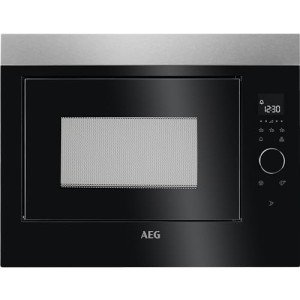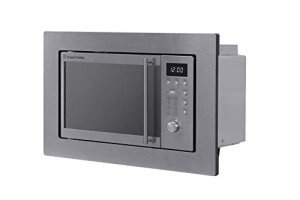9 Things Your Parents Teach You About Microwave Oven Builtin
페이지 정보

본문
 Choosing a Microwave Oven Builtin
Choosing a Microwave Oven BuiltinA built in microwave best-in microwave could be an excellent option if fed up with freestanding models that take up space on the worktop. They're designed to fit into cabinets and certain models can be placed flush to create a seamless look.
 While features such as pre-programmed settings and sensor cooking are useful however, you should only select a model with features that you'll actually use. Be sure to consider the cost of installation. This should be handled by a professional.
While features such as pre-programmed settings and sensor cooking are useful however, you should only select a model with features that you'll actually use. Be sure to consider the cost of installation. This should be handled by a professional.Size
When choosing a builtin microwave oven you should consider the size of your cabinet and kitchen into consideration in order to select the correct model for your space. Microwaves are generally available in 24-, 27- and 30-inch widths to adhere to standard sizes for cabinets. It is important to take into consideration the capacity, as it will determine the quantity of food you can cook in a given time.
Cost is a crucial factor to take into account when choosing a microwave. Microwaves are available in various price ranges dependent on the dimensions, features and the brand you select. Installation costs are also to be taken into account. Freestanding microwaves are typically cheaper to buy and install, as you place them on the counter and plug them in.
Power
The cooking power of a microwave (wattage) will determine how quickly and efficiently your food will be cooked. Higher watts tend to cook faster, however lower-end models are still able to meet most requirements. We recommend selecting a microwave with at minimum 1,000 watts. Microwaves with lower watts can cook unevenly and require longer to cook food than microwaves with higher wattages.
To find the wattage of your microwave, refer to your user manual or look at the serial number plate inside. You can compare the wattage between different models to determine the best integrated combination microwave one for your requirements.
Microwaves can be designed to fit inside the cabinet, or inserted into the wall for an integrated appearance. Certain microwaves come with high-end finishes and feel to give a high-end appearance. You can also find countertop microwaves with black built in microwave-in installation kits to make space and give a custom look to your kitchen.
While a microwave oven builtin offers a seamless appearance, you'll have to pay more for the convenience of this installation option compared to other types of microwaves. These models can be harder to replace or repair if they fail and you'll need to pay someone to put them in place. Over-the-range microwaves and counter-top models don't require installation fees. You'll have to make sure that the model you select fits the location you intend to use it. You'll need to measure your space to locate a microwave that has a capacity that suits your requirements. The bigger the microwave needs to be to accommodate the dishes, the greater power you will require.
Convection
A microwave oven that has convection technology allows you to bake or brown food items in addition to defrosting and reheating. The microwave oven's fan and heating element combine to circulate hot air around food in the microwave oven similar to an oven roaster, which allows the appliance to cook food more evenly than conventional microwaves.
Microwave radiation is emitted from the magnetron that is located in a small chamber in the oven, generating microwaves that heat up and cook the food. Microwaves are a form of non-ionizing electromagnetic radiation, and have been found not to cause cancer in rodent studies that have been conducted over a long period of time. In contrast to conventional ovens that emit high-energy radiation that can cause burns, the microwaves produced by microwave ovens are emitted through the oven door and are not an immediate risk to safety.
Vibrations and the various rates at which food absorbs energy can result in uneven heating in a dish that has been microwaved. You can reduce these problems by stirring the food or using a rotating turning table that rotates the dish while it cooks.
Some builtin microwaves are designed to fit inside cabinets in kitchens for an attractive appearance and simple access. These models often have trim kits to fill in any gaps between the cabinet and the microwave to ensure a perfect finish. Other models are countertop models that can be placed on kitchen counters and plug directly into the power outlet. Countertop models can be used to replace a countertop oven or can be paired with a microwave to make an all-in-one appliance that makes the most of space. Certain countertop models come with a pull-out drawer that can be closed and opened by pressing an electronic button for easier access.
Controls
A built-in microwave can save you space on your counter by eliminating the need for an additional appliance. It can be installed in a cabinet or attached to the wall for an aesthetically pleasing kitchen. The proper size, power, and features is crucial to suit your family's cooking requirements.
The controls on a built-in microwave can vary in their features, but they generally have an LCD or LED display to show cooking results and program, buttons for selecting the desired cook time and a defrost function. Some models use a sensor to automatically detect and defrost food by pressing a button. A timer or key lock, as well as a safety lock can prevent accidental or unintentional operation.
Certain manufacturers also have models with a touch screen, for added convenience, and several have finishes such as stainless steel with PrintShieldTM, which is resistant to fingerprints and smudges. A microwave tray that is dishwasher safe makes cleanup easy.
Microwave ovens cook food by using electromagnetic waves of very short wavelengths, which vibrate molecules directly inside the cooking chamber. The technology was developed following World War II using radar technology, which was employed during the war. The radiation emitted by the microwave is not Ionizing and is not any health risks when the oven door is shut and latched properly.
A built-in microwave can be used to replace the countertop or undercounter model. It can also be installed in the wall or over-the-range oven. A professional installer can complete the installation for you. Based on the size of your cabinet, it might be necessary to replace a panel in order to accommodate the new appliance. A microwave may require ventilation, so consider whether your existing cabinetry can handle the additional noise and airflow.
Style
While traditional countertop microwaves are set directly on the counter in your kitchen and over-the-range models sit on top of your stove, built-in microwaves can be integrated into your cabinetry for an elegant look. You can choose from a range of installation designs, including the slide-out drawer as well as a flush mount. This lets you place the microwave at a height that is comfortable for your family. These microwave types also offer higher-end features to give an elegant feel.
When weighing your options, it's important to consider how often you use the features of a microwave, and if they are compatible with your daily cooking routine. For instance, pre-programmed settings and defrost settings could simplify the meal preparation process for busy families, but you'll want to determine if these features actually add convenience or simply replace manual steps.
Certain manufacturers have also played with combination microwave-ranges which combine a traditional oven with microwave capabilities. These models are a great option for households that frequently utilize both conventional and microwave sources, but are limited in counter space.
It is essential to research local codes and regulations, regardless of the model you select, before installing a micro-wave within your home. You may require an installation permit or professional assistance, especially if ductwork is required. Additionally, you'll need ensure that there is enough ventilation in the area you plan on installing the microwave. Venting systems can help ensure that the appliance functions safely and reduces the risk of carbon monoxide poisoning.
- 이전글Who's The Most Renowned Expert On Volkswagen Car Key Replacement? 24.12.14
- 다음글5 Killer Quora Answers To Tilt And Turn Double Glazed Windows 24.12.14
댓글목록
등록된 댓글이 없습니다.


